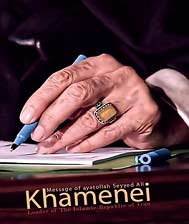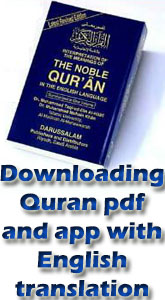What Is the Hadith of al–Thaqalayn?

What Is the Hadith of al–Thaqalayn?
The hadith known as al-Thaqalayn [1] (lit. the two weighty and precious things of high estimation and care) counts as one of the widely and successively transmitted hadiths reported from the Prophet, the Chosen, upon whom and whose household be blessing, and one of the most authenticated sayings with respect to its chain of transmission.
Hence, it enjoys special importance. The Messenger of God, upon whom and whose household be blessing, delivered it at several points and on diverse occasions. It has been narrated by thirty – five Companions [2], just as it has been transmitted by recording scholars and traditionists in their collections and books of traditions [3]. As well, it is accounted one of the crucial Hadiths to which tens of Sunni sources, including their books of Hadith, Qur’an commentary, history, and lexicons have referred in a widely and successively transmitted manner, [4] apart from the Shiite sources that have reported it in the same manner.
Why is it called al – Thaqalayn?
This hadith is called al-Thaqalayn because it includes the utterance al-Thaqalayn [5] by which is meant the following:
1. The Holy Qur’an that is the greater weight.
2. The pure near kindred of the Prophet, the Ahl al-Bayt, that is the smaller weight.
The Text of the Hadith of al-Thaqalayn
The traditions have transmitted this hadith in various modes of expression. However, these texts are all agreed in their meaning and purport. The difference in expression may be attributed to the diverse utterances delivered by the Messenger of God, upon whom and whose household be blessing, at many points and on several occasions.
Here we refer to two samples of expression related to the Hadith of al-Thaqalayn. He who wishes to gain cognizance of the different modes the Hadith may refer to a treatise on the Hadith of al-Thaqalayn, published by the Hall for Approximation among the Islamic Schools of Thought in Cairo. [6]
The First Sample: In Sahih Muslim it is reported from Zayd ibn Arqam that he said: The Messenger of God, upon whom and whose household be blessing, stood up in order to deliver a sermon to us by a pool known as Khumm, between Mecca and Medina. He praised and lauded God (high exalted be He), and then he preached and called our attention. Thereafter he said: Now then, lo! O people! I am just a mortal, so I may shortly answer ‘at Your service’ to my Lord’s call. I am leaving with you two weighty and precious things. The first is the Book of God wherein is guidance and light. So cling to the Book of God and hold fast thereto. He continued to incite to the Book of God and made us to desire it. Then he said: And my Ahl al-Bayt (the Folk of my House). Be mindful of my Ahl al-Bayt before God!. Be mindful of my Ahl al-Bayt before God! [7]
The Second Sample: Abu al-Nadr related to us. He said: Muhammad, that is Ibn Talhah, related to us Lord’s from al-A‘mash, from ‘Atiyyah al-‘Awfi, from Abu Sa‘id al-Khudri, from the Prophet, upon whom and whose household be blessing, who said: I shall shortly answer ‘at Your service’ to (my Lord’s) call. I am leaving with you the two weighty and precious things: The Book of God (exalted and majestic be He) and my near kindred. The Book of God is a cord stretched from the heaven to the earth, and (hold fast to) my near kindred, the Folk of my House, too. (God), the Subtle, the All-aware, has informed me that they will never be separated until they join me at the pond (on the Day of Judgement). Now take care how you all will leave them behind ! [8]
Who are the Ahl al-Bayt?
‘A’ishah is reported to have said: The Prophet, upon whom and whose household be blessing, went forth in the morning, putting on a Yemeni garment of black pelt. Thereupon, al-Hasan ibn ‘Ali came and he admitted him. Then al-Husayn came and entered with him. Then Fatimah came and he admitted her. Then Fatimah came and he admitted her. Then ‘Ali came and he admitted him there into. Thereupon he said: “God only desires to put away from you uncleanness, O Folk of the House, and purify you with a thorough purification.” [9]
Umm Salamah is reported to have said: At my home were His words revealed: “God only desires to put away from you uncleanness, O Folk of the House, and purify you with a thorough purification”.[10]
So the Messenger of God, upon whom and whose household be blessing, sent word to ‘Ali, Fatimah, al-Hasan and al-Husayn. (When they approached,) he said: These are the Folk of my House.[11]
‘Umar ibn Abi Salamah, a foster son of the Prophet, is reported to have said: When this verse was revealed to the Prophet, upon whom and whose household be blessing, “God only desires to put away from you uncleanness, O Folk of the House, and purify you with a thorough purification” at the dwelling – place of Umm Salamah, he called Fatimah, Hasan, Husayn, and ‘Ali to stand up behind him, so he wrapped them with a garment and said: O God! These are the Folk of my House. So put away from them uncleanness and purify them with a thorough purification. Umm Salamah said: Shall I be in their company, O Prophet of God? To which he replied: You may remain in your place and you are upon good.[12]
Moreover, the Messenger of God, upon whom and whose household be blessing, has declared that which is meant by the Folk of the House and clarified it, saying: Surely every Prophet has a folk and an object of high estimation and care and these, that is ‘Ali, Fatimah, al-Hasan, and al-Husayn, are the Folk of my House and the object of my estimation and care.[13]
He, upon whom and whose household be blessing, also said: If the Prophets had an object of high estimation and care, then ‘Ali, Fatimah, al-Hasan, and al-Husayn are the Folk of my House and the object of my high estimation and care.[14]
When Did the Prophet Make Mention of this Hadith?
The Messenger of God, upon whom and whose household be blessing, made mention of the Hadith of al-Thaqalayn at numerous points, among which are the following: 1) After his departure from al-Ta’if; 2) On the day of Arafah during the farewell pilgrimage;3) On the day of Ghadir Khumm; 4) Upon his pulpit in Medina; 5) In his blessed room during his last illness, while the room was overcrowded.
What is Derived from the Hadith of al-Thaqalayn?
Many points can be derived from the Hadith. Below are a number of these points:
1. There is a close connection and link between the Qur’an and the pure near kindred that is the Folk of the House, upon whom be peace.
2. Just as falsehood cannot come at the Qur’an from before or behind, so too is the case with the Folk of the House, upon, for they are infallible and sinless. Otherwise, there would have been separation between them, which has been explicitly denied by the Messenger of God, upon whom and whose household be blessing, in his words: They will never be separated until they join me at the Pond (on the Day of Judgment).
3. Adherence to the Holy Qur’an and the pure near kindred, upon whom be peace, together necessitates immunity from error and guarantees absence of any deviation from the divine course. For what is meant by adherence to the Qur’an is to keep to its teachings. In the same way, to hold fast to the pure near kindred is to keep to their teachings, upon whom be peace.
Collection & Translation by www.darolhadith.net
1. Al – Thaqalayn is either derived from thaqal in the sense of load and baggage or derived from thiql in the sense of heaviness, in which case the Hadith would convey that acting upon (the requirements of) al-Thaqalayn is heavy and weighty.
2. It is worth noticing here that the reporters of the Hadith of al-Thaqalayn are very likely to exceed the foregoing number, as it is clear when we refer to the numerous proof texts of this Hadith, which are different in expression, yet united in meaning. This indicates that the Prophet, upon whom and whose household be blessing, has declared such a purport at numerous points and on several occasions. The reason for the restriction of the number of reporters to the foregoing may be referable to the unjust rulers opposing the transmission of such Hadiths. Based on this, it is an outcome of the suppressive practices followed by those usurpers against the reporters of the merits of the Ahl al-Bayt, upon whom be peace.
3. This Hadith has been transmitted by the great scholars of all the schools of thought, of old and recently, in their collections, books of Hadith, commentaries, biography, history, lexicons, etc. For more information you may refer to a treatise on the Hadith of al-Thaqalayn, vol.5, published by the Hall for Approximation among the Islamic Schools of Thought, Cairo, 1374-1955.
4. The great scholar Sayyid Mir Hamid Husayn al-Hindi (may God sanctify his pure soul) has reported this Hadith from a total of 200 eminent scholars from different schools of thought, from the second century to the thirteenth century A.H., and more than 30 Companions, men and women. Refer to a treatise on the Hadith of al-Thaqalayn, vol.9, published by the Hall for Approximation among the Islamic Schools of Thought, Cairo, 1374-1955.
5. This Hadith is also known as the Hadith of adherence (al-tamassuk).
6. Refer to a treatise on the Hadith of al-Thaqalayn, published in Egypt, Cairo, 1374-1955. The treatise has transmitted the Hadith from forty authentic sources. As well, the scholar Sayyid Mir Hamid Husayn al-Hindi (may God sanctify his pure soul) has collected the chains of transmission and texts of the Hadith in six volumes from among his encyclopedic work known as ‘Abaqat al-Anwar.
7. Sahih Muslim, vol.4, p. 1873, Hadith 2408 (Egypt: ‘Abd al-Baqi) and (Lebanon: Dar Ihya’ al-Turath al-‘ArAbi and Dar al-Qalam).
8. Musnad Ahmad, Hadith 10707. Refer also to Sahih Muslim, vol.4, p.1873, wherein he transmitted it from Zayd ibn Arqam.
9. Sahih Muslim, vol. 4, p. 1883, Hadith 2424 (the book of the Companions’ merits), Beirut.
10. The Holy Qur’an 33:33.
11. Al-Hakim al-Naysaburi, al-Mustadrak ‘ala al-Sahihayn (Beirut), vo.3, p.146 (the book of knowledge about the companions). In it al-Hakim said: This is a sound tradition according to the conditions of al-Bukhari, but he did not transmit it.
12. Sahih al-Tirmidhi, vol.5, p. 351, Hadith 3105 (the book of Qur’an commentary); also vol.5, p.663, Hadith 3787 (the book of merits), Beirut.
13. Fakhr al-Din ibn Muhammad al-Turayhi, Majma‘ al-Bahrayn (Tehran: Al-Murtadawi Bookstore, 1365 solar calendar, 2nd.ed.) vol.5, p.330.
14. Majma‘ al-Bahrayn, vol.5, p.331.
Ashura
- The Third Imam, Husayn Ibn ‘Ali (as)
- A brief look at the Life of Imam Hussein
- Karbala – the Rendezvous of Faith
- In the School of Imam Husain (AS) – 2
- In the school of Imam Husain (AS) - 1
- Ziarat-e-Ashura
- The Imam Husayn's Concepts of Religion and Leadership
- Karbala and the Imam Husayn in Persian And Indo-Muslim literature
- Hazrat Zainab's(s.a) Marriage
- Hazrat Zainab (s.a.) and Imamate
- Hazrat Zainab (s.a.) in Karbala
- Who was Yazid?
- SHIMR B. ZIL JAWSHAN
- The Imam’s Brother, ‘Abbās's Martyrdom
- The Martyrdom of Abalfazl-Abbas(A)
- The short life History of Hadhrat Abbas (as)
- Titles of Hazrat Abbas (a.s.)
- The Imam’s Brother, ‘Abbās's Martyrdom
- A short biography of Hazrat Ummul-Baneen (s.a)
- The Standard Bearer of Husain
Articles
- The Actions of God
- Methods of Tabligh (propagation)
- The Signs of the Appearance (Zuhur) of the Mahdi
- Further Investigation in the Hadith-Reports
- How Will the Imam Know That the Time for the Appearance (Zuhur) Has Come?
- The Minds of the People Prepare for the Advent of the Mahdi
- The Residence of the Twelfth Imam
- The Research about Longevity
- The Sunni Books on the Characteristics of the Mahdi
- Why Did Not the Occultation Become Complete from the Beginning?
- Can a Five Year Old Boy Become an Imam?
- Who Was the Imam after Hasan Al-'Askari?
- The Unseen World and the Imam of the Age
- Mahdiism, the Jews, and the Iranians
- The Pseudo-Mahdis
- The Beginning of the Belief in the Mahdi
- Love, Sexual Discipline and Chastity. Democratic Morality, Love in Personality Growth
- Basic Need for Humane Conditioning of Natural Instincts And Desires
- A Critical Examination of The Theoretical Basis of The Proposed New Sexual Freedom
- Proposed New Sexual Freedom
Shiite Studies
- Who is a Real Shia Muslim?
- SHI'ITE RELIGIOUS THOUGHT
- Heavenly Warrant
- What does “Shi‘ah” mean?
- Why do the Shī‘ah prostrate on turbah (dried clay)?
- Is according to Islam religion separate from politics?
- What are the sources of Shī‘ī jurisprudence (fiqh)?
- Shia’ jurisprudence
- The features of Shia' ethics
- 22 Not a new lifestyle
Wahabiyat

I am a film writer writing a film presently with the aim of promoting Islamic unity and solidarity
the most visited materials
- Who Is Almighty Allah? (260673)
- Who is a Real Shia Muslim? (246397)
- Islam and Its Social System (243357)
- How I find that Islam does not Oppress Women? (241773)
- Brief History of Religions (241678)
- Islam Attacks Slavery 1 (241043)
- The Clearest Reason for Free Will (239758)
- The Advantages of Religion 1 (238693)
- Attributes of The Real Follower of Imams in Their Teachings (235546)
- Fundamental principles of Islam (235106)
- RIGHTS OF SCHOLARS (234421)
- The Rights Islam Offers to Women (233726)
- Islam Various Systems (232544)
- What are the differences between Shia and Sunni Muslims؟ (232536)
Islam Studies
- Fundamental principles of Islam (235106)
- RIGHTS OF SCHOLARS (234421)
- Islam Various Systems (232544)
- Some Hadithes on the Faith of AbuTalib (131293)
- Islam and the Genuine Needs of Every Epoch (121973)
- Islam and Racism (119298)
- Why did God locate Kaaba in a barren desert? (112536)
- Islam and Traditional Sexual Ethics (109826)
- Does Islam permit Contraception? (109516)
- Importance of Marriage in Islam (107977)
- How to ponder on the Philosophy of Islamic Laws? (98978)
- Is there any consensus on prohibition of constructing mausoleum? (98580)
Judaism،Christianity
- I attended Muslim prayers several years ago when the speaker was talking about Jesus and Islam. (73539)
- I have been fortunate in the sense that I had a Muslim father and a Christian Mother. (73161)
- Sir I was looking for some precise proof of our belief that the Bible available in the current time is corrupt, through protestant beliefs and the proofs being scientific as well. (63817)
- What does Islam say about Prophet Isa (pbuh) walking on water? (61463)
- Is it a sin reading the Bible? (60992)
- Do Christians acknowledge the Prophethood of Khidhr and recognize him officially? (60504)
- Is it true that Lady Maryam would receive food and fruit from heaven? (59868)
- In verse 55 of Aal-i Imran, God states that: (58978)
- Why do they call Prophet Isa “The Spirit of God”? (57673)
























